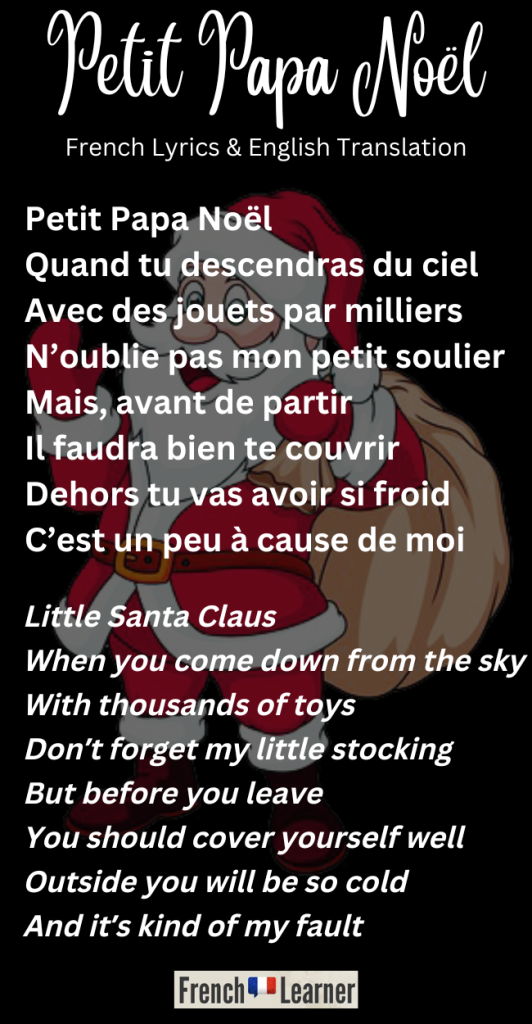Petit Papa Noël (Meaning: Little Father Christmas or Little Santa Claus; Pronunciation pəti papa nɔɛl) by Raymond Vincy and Henri Martinet is the most famous French Christmas song of all time. The song was initially recorded by Tino Rossi in 1946 and has been recorded by countless other artists since then.

Song overview
The lyrics to song Petit Papa Noël are sung from the perspective of a child who’s begging for Santa Claus to come to their house and deliver toys.
The song’s description of Christmas is entirely from a child’s view point. For example, the lyrics mention going to bed well past bedtime, not being able to wait to see what Santa delivered, asking Santa to not forget the stockings and asking for forgiveness for not being well behaved during the year.
Listen to Petit Papa Noël
The following YouTube video for Petit Papa Noël has over 100 million views and includes the French lyrics.
The following YouTube video is of the legendary French-Canadian singer Céline Dion singing Petit Papa Noël in 1981 when she was thirteen years-old.
You can listen to Tino Rossi’s recording on Spotify:
Other recordings
Petit Papa Noël has been recorded by many other leading singers including French-Canadian singer Roch Voisine, Raffi, Francine Chantereau, Josh Groban,
Lyrics analysis
C’est la belle nuit de Noël
This line translates literally to “It’s the beautiful night of Christmas”. The more common term for Christmas eve is le réveillon de Noël.
La neige étend son manteau blanc
This line translates to “The snow spreads out on a white blanket”. Neige means snow in French. This page on our site offers a complete list of weather terms.
The verb étendre means to spread out. The noun manteau translates to coat or jacket but means “blanket” in the context of snow. Blanc means white. This page on our site covers colors.
Et les yeux levés vers le ciel
This line translates to “And eyes are raised towards the”, referring to the kids’ eyes. The preposition vers translates to “towards” or “at”.
À genoux, les petits enfants
This line translates to “The little children are on their knees”. The expression à genoux translates to “on your knees” or kneeling.
Avant de fermer les paupières
This line translates to “Before closing their eyelids”. The grammatical construction “avant de + infinitive” means “before verb + ing”. Thus, “avavnt de fermer” means “before closing”.
Font une dernière prière
The line translates literally to “do a last prayer”. However, our translation was “say” a last prayer as one “says” a prayer in English.
Petit Papa Noël
The title of the song translates to “Little Santa Claus”. Another commonly used term for Santa Claus in French is le Père Noël, or Father Christmas.
Quand tu descendras du ciel
This line translates to “When you come down from the sky”. There are two ways to say you in French: tu and vous. In this song, Papa Noël (Santa Claus) is being addressed in the familiar tu form.
Avec des jouets par milliers
This line translates to “With thousands of toys”. Avec means with in French. Interestingly, the verb jouer means to play and the noun jouet means toy. Par milliers translates literally to “by thousands”.
N’oublie pas mon petit soulier
This line translates to “Don’t forget my little stocking”. N’oublie pas (don’t forget) is an example of the imperative mood, the form used to give commands. The word soulier is old French for shoe.
Mais, avant de partir
We translated this line to “But before you leave”. It used the “avant de + infinitive” construction. Hence, the line could also translate to “before leaving”.
Il faudra bien te couvrir
We translated this line to “You should cover yourself well”. Il faudra is the expression il faut written in the futur simple, a commonly used French future tense. Il faut a commonly used impersonal expression that translates to “it’s necessary” or “you have to”.
Dehors tu vas avoir si froid
The line translates to “Outside you will be so cold”. Tu vas avoir means “you’re going to have”. This is the French futur proche, another commonly used future tense which combines aller (to go) with an infinitive.
The expression avoir froid means “to be cold”. Many sensation expressions use the verb avoir (to have). Froid means cold in French. This page on our site covers French weather expressions.
C’est un peu à cause de moi
This line translates literally to “It’s a bit because of me” and our translation was “And it’s kind of my fault”. The expression à cause de translates to “because of” in the context of blame. Moi means me in French.
Il me tarde tant que le jour se lève
This line translates literally to “It’s late to me that the day rises” and our translation was “I can’t wait for daybreak”. The expression “Il me tarde de + infinitive” means “I can’t wait for”.
Pour voir si tu m’as apporté
This line translates to “To see if you brought me”. In French, the construction pour + infinitive means “for” or “in order to”.
Si has several meanings including “if”, “yes” (when contradicting a question being asked in the negation) and “so”.
Tu m’as apporté means “you brought me”. This line is in the passé composé, a commonly used French past tense.
Tous les beaux joujoux que je vois en rêve
This line translates to “All the nice toys I see in my dreams”. Joujoux is a cute way of saying jouet (toy).
Et que je t’ai commandés
This line translates to “And that I ordered from you”. In French, commander means to order and ordonner means “to order around”. This page explains ordonner vs commander.
Le marchand de sable est passé
This line translates to “It looks like it’s past bedtime”. The expression marchand de sable translates literally to “sand seller” the entire expression, “the sand seller has passed” means “it’s past bedtime”.
Les enfants vont faire dodo
This line translates to “The kids are going to go to sleep”. In French, faire dodo is an expression used by children and their parents to mean “to go to sleep” and “to go to bed”.
Et tu vas pouvoir commencer
This line translates to “And you’ll be able to start”. This line is in the previously mentioned futur proche tense the verb pouvoir translating to “can” or “be able to”.
Avec ta hotte sur le dos
This line translates to “With your sack on your back”. Hotte is a literary word meaning “sack”. Dos means back in French. This page on site covers body parts vocabulary in detail.
Au son des cloches des églises
This line translates to “To the sound of church bells”. In French, son means “sound”. Son is also a possessive adjective meaning his and her.
Ta distribution de surprises
This line translates to “Your delivery of surprises”. In French, distibution translates to both distribution and delivery.
Et quand tu seras sur ton beau nuage
This line translate to “And when you’re beautiful cloud”. Seras means “you will be” and is the futur simple form of être (to be).
Viens d’abord sur notre maison
This line translates to “Come first to our house”. In French, d’abord can translate to first, firstly or first of all. Viens is the second-person familiar form of venir (to come).
Je n’ai pas été tous les jours très sage
This line translates literally to “I wasn’t all the days very well behaved” and our translation is “I wasn’t well behaved everyday”. Été is the past participle of être (to be). The adjective sage translates to well behaved and wise.
Mais j’en demande pardon
This line translates to “But I’m asking you to forgive me”. The expression demander pardon à quelqu’un means to ask somebody for forgiveness.

Petit Papa Noël French lyrics & English translation
C’est la belle nuit de Noël
La neige étend son manteau blanc
Et les yeux levés vers le ciel
À genoux, les petits enfants
Avant de fermer les paupières
Font une dernière prière
It’s the beautiful Christmas eve
The snow spreads out on a white blanket
And eyes are raised towards the
The little children are on their knees
Before closing their eyelids
Saying a last prayer
Petit Papa Noël
Quand tu descendras du ciel
Avec des jouets par milliers
N’oublie pas mon petit soulier
Mais, avant de partir
Il faudra bien te couvrir
Dehors tu vas avoir si froid
C’est un peu à cause de moi
Little Santa Claus
When you come down from the sky
With thousands of toys
Don’t forget my little stocking
But before you leave
You should cover yourself well
Outside you will be so cold
And it’s kind of my fault
Il me tarde tant que le jour se lève
Pour voir si tu m’as apporté
Tous les beaux joujoux que je vois en rêve
Et que je t’ai commandés
I can’t wait for daybreak
To see if you brought me
All the nice toys I see in my dreams
And that I ordered from you
Petit Papa Noël
Quand tu descendras du ciel
Avec des jouets par milliers
N’oublie pas mon petit soulier
Little Santa Claus
When you come down from the sky
With thousands of toys
Don’t forget my little stocking
Le marchand de sable est passé
Les enfants vont faire dodo
Et tu vas pouvoir commencer
Avec ta hotte sur le dos
Au son des cloches des églises
Ta distribution de surprises
It looks like it’s past bedtime
The kids are going to go to sleep
And you’ll be able to start
With your sack on your back
To the sound of church bells
Your delivery of surprises
Et quand tu seras sur ton beau nuage
Viens d’abord sur notre maison
Je n’ai pas été tous les jours très sage
Mais j’en demande pardon
And when you’re beautiful cloud
Come first to our house
I wasn’t well behaved everyday
But I’m asking you to forgive me
Petit Papa Noël
Quand tu descendras du ciel
Avec des jouets par milliers
N’oublie pas mon petit soulier
Little Santa Claus
When you come down from the sky
With thousands of toys
Don’t forget my little stocking
Petit Papa Noël
Little Santa Claus
Discover more:
- Noël Blanc (White Christmas) lyrics
- Vive Le Vent (Jingle Bells) Lyrics
- Minuit Chrétien (O Holy Night) Lyrics
- Top French Christmas Songs
- French Christmas Vocabulary
- How to say “Merry Christmas” in French
- Christmas in France – Common Traditions

All posts by David Issokson

